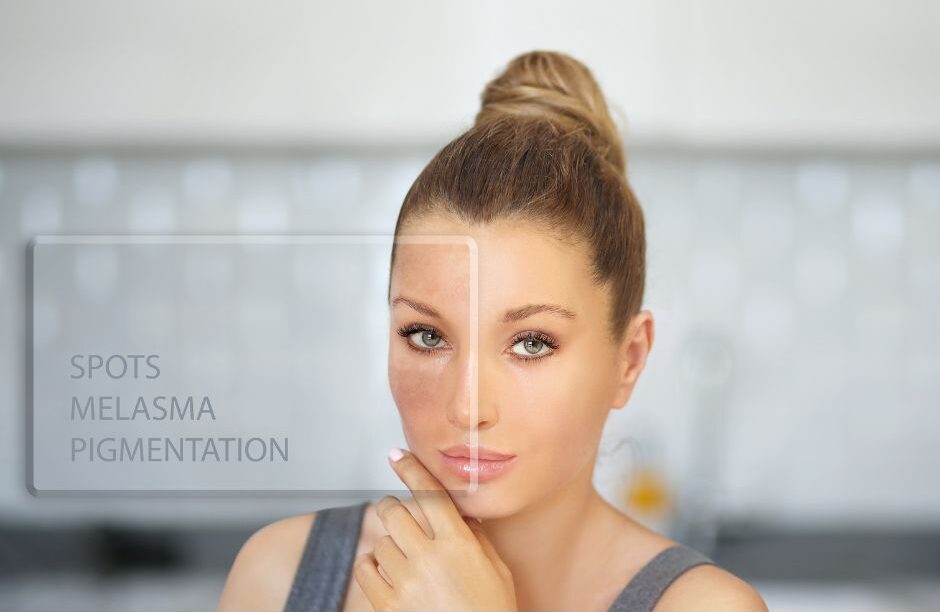Have you ever noticed dark patches or uneven skin tone on your face? It’s a common skin condition called hyperpigmentation that affects millions of people worldwide. Not only can it affect your self-confidence, but it can also be challenging to treat.
But fear not, because in this article, we will discuss effective ways to get rid of hyperpigmentation and achieve clear, radiant skin. From natural remedies to professional treatments, we will cover it all.
Table of Contents
What is a Hyperpigmentation?
Hyperpigmentation is a common skin condition that occurs when certain areas of the skin become darker than the surrounding skin due to an excess production of melanin.
What Causes Hyperpigmentation?
- Sun exposure,
- Hormonal changes
- Inflammation, or
- Skin injuries.
You can experience brown, black, gray, red or pink spots or patches on your skin.
Dealing with it can be frustrating and affect one’s self-confidence. However, there are several treatments and products available that can help reduce the appearance of dark spots and even out the skin tone.
Remember that everyone’s skin is unique, so what works for one person may not work for another. Patience and consistency are key when it comes to treating hyperpigmentation.
By understanding the causes and available treatments for this condition, you can take proactive steps towards achieving a more even complexion and feeling confident in your skin again.
Precaution is Better than Cure

Step 1: Identify the Cause
The first step in treating hyperpigmentation is understanding what is causing it. Whether it’s sun exposure, hormonal changes, or post-inflammatory marks, identifying the root cause will help you choose the right treatment approach.
Step 2: Use Targeted Skincare Products
Invest in skincare products that are specifically formulated to target hyperpigmentation. Look for ingredients like vitamin C, niacinamide, and retinoids that can help lighten dark spots and even out your skin tone. Incorporating these products into your daily skincare routine can help fade dark spots over time.
Step 3: Protect Your Skin
Prevention is key when it comes to managing hyperpigmentation. Make sure to wear sunscreen every day, even on cloudy days or when staying indoors. Sun protection not only prevents further darkening of existing spots but also helps in maintaining overall skin health.
Consistent use of sunscreen is crucial in preventing further pigmentation issues and protecting the skin from harmful UV rays.
By following these 3 steps consistently and incorporating them into your skincare regimen, you can effectively combat hyperpigmentation and achieve a more radiant complexion.
3 Natural Ingredients For Hyperpigmentation
While there are various treatments available, exploring natural home remedies can be a gentle yet effective way to address this concern.
- Lemon juice :- with its natural bleaching properties, it is often recommended as a home remedy for hyperpigmentation. Applying freshly squeezed lemon juice to the affected areas can help lighten the dark spots over time.
2. Aloe vera gel :- Known for its soothing and healing properties, applying aloe vera gel directly to the hyperpigmented areas can help reduce inflammation and promote skin regeneration.
3. Turmeric :- This is a spice commonly found in many households, is also known for its skin-brightening properties. Creating a paste with turmeric powder and water or honey and applying it to the affected areas can help even out skin tone and reduce hyperpigmentation.
While these home remedies may show gradual results, they offer natural alternatives to conventional treatments for hyperpigmentation.
Professional Treatments
When it comes to addressing hyperpigmentation, seeking professional treatment can provide effective solutions tailored to individual skin concerns. Dermatologists offer a range of treatments, such as
- Chemical peels:– One of the most common professional treatments for hyperpigmentation is chemical peels. These treatments involve applying a solution to the skin that exfoliates the outer layers, revealing fresher, more evenly pigmented skin underneath. Chemical peels can help reduce the appearance of dark spots and improve overall skin texture.
- Laser therapy:-Laser therapy is another popular option. Laser treatments target specific areas of excess pigment in the skin, breaking down melanin deposits and stimulating collagen production for smoother, more uniform skin tone.
- Microdermabrasion:- Microdermabrasion is a non-invasive procedure that uses a handheld device to gently exfoliate the outer layer of the skin. This treatment helps reduce hyperpigmentation by promoting cell turnover and revealing brighter, more radiant skin.
- In addition to in-office procedures, dermatologists may recommend prescription skincare products containing ingredients like hydroquinone, retinoids, or vitamin C to help fade dark spots and prevent new pigmentation from forming.
Consult with a dermatologist to understand the best course for you.
Final Thought
By consulting with a dermatologist and exploring tailored treatment options, individuals can address their specific concerns and achieve clearer, more even-toned skin.
Additionally, incorporating foods rich in antioxidants like berries, green tea, and leafy greens into your diet can support overall skin health and potentially improve hyperpigmentation from within.
Remember, patience and consistency are key when it comes to treating skin concerns like this.
So, say goodbye to hyperpigmentation and hello to a healthier, brighter complexion.
FREQUENTLY ASKED QUESTIONS
Does hyperpigmented skin go away?
Most of the time, it go away on its own but melasma; the one that is cuased by hormonal changes takes time or sometimes needs professional treatment.
Can you reverse skin pigmentation?
Yes, but with professional treatments that are mentioned in the article. Chemical peels, laser therapy, microdermabrasion, or dermabrasion are all options that work similarly to rid skin of hyperpigmentation. They remove the top layer of your skin where the dark spots lie.
How long does it take for hyperpigmentation to fade?
About 6 to 12 months
What fades hyperpigmentation the fastest?
Vitamin C
Does pigmentation get darker before it gets better?
Yes. It is a sign that the treatment is working.
What is Hypopigmentation?
When the person’s skin color becomes darker it is hyperpigmentation(increase of melanin) and when the skin colour changes lighter it is hypopigmentation(because skin cells don’t make enough melanin).
